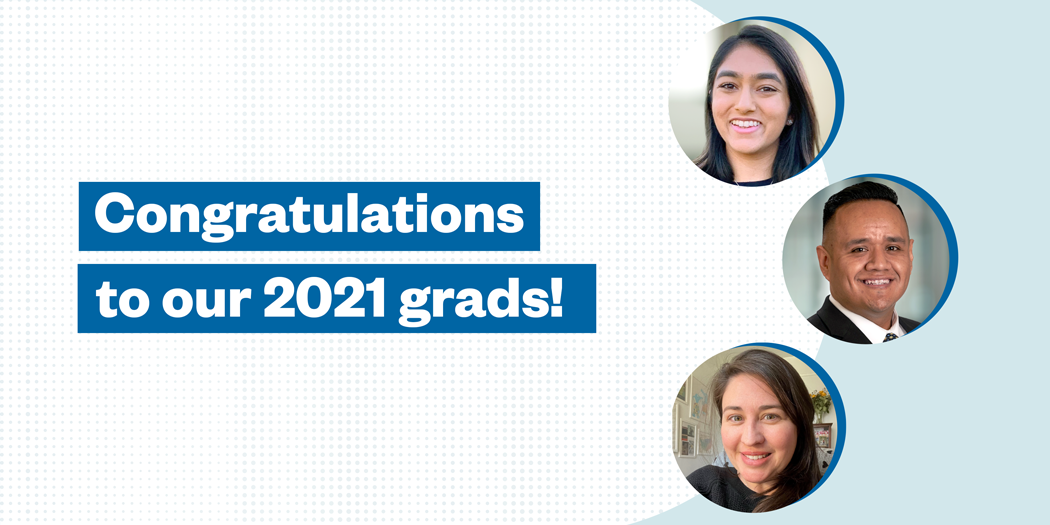This has been a school year unlike any other, but one thing has remained the same: The students who work at CCRC have astounded us with their ability to seemingly do it all. Not only did Umika Kumar, Armando Lizarraga, and Nicole Lorenzetti make valuable contributions to several CCRC research projects, but they also completed advanced degrees this year. Kumar finished her master’s in sociology from the London School of Economics; Lizarraga earned his master’s in higher and postsecondary education from Teachers College, Columbia University; and Lorenzetti completed her PhD in educational psychology at the CUNY Graduate Center. Our work would not be possible without the students on our staff, and we hope you’ll join us in extending congratulations to the class of 2021. Learn more about all three researchers’ accomplishments below.
Umika Kumar, Research Assistant
Umika Kumar, who joined CCRC in January 2021, completed her master’s degree in sociology at the London School of Economics in December 2020. Her work culminated in a dissertation that used astrology as a case study for examining how culture is technologically and socially created and recreated.
Kumar is a research assistant at CCRC supporting several guided pathways projects, including the center’s virtual summer institute, which will bring together a cohort of 25 rural colleges to build the skills and knowledge needed to lead college-wide student success efforts.
“I’m enjoying working at a place where I feel like I can make a meaningful impact on the world, and specifically, people’s access to higher education in service of their ability to have a life-sustaining job,” Kumar said. “I’m excited to bring the research skills and expertise that I developed while at the LSE to my work at CCRC.”
Kumar, who is also the editor-in-chief of LSE’s New Sociological Perspectives journal, brings a personal lens to our work on community colleges; she earned a certificate in leadership and social change from De Anza College in Cupertino, California, before transferring to UCLA for her bachelor’s degree.
Armando Lizarraga, Research Assistant
Armando Lizarraga earned his master’s degree in higher and postsecondary education from Teachers College this year. Since joining CCRC in July 2020, Lizarraga has focused on how student support services can boost equity and efficiency at community colleges.
Lizarraga, who earned his associate degree from El Camino College in Torrance, California, before transferring to UCLA, pursued his master’s degree to learn about how education intersects with race, class, and power.
“Through this understanding, I hope to continue to have conversations that challenge institutional barriers for underrepresented students and narrow educational disparities in every postsecondary academic sector,” he said.
Along the way, Lizarraga learned some valuable lessons, including the importance of “not speaking for other identities/ communities, but amplifying their experiences and voices.”
This fall, Lizarraga will begin a PhD program in higher education leadership at the University of Texas at Austin. He will also join UT’s Project MALES, a mentorship and research initiative that works to advance equitable education outcomes for male students of color.
Nicole Lorenzetti, Senior Research Assistant
Nicole Lorenzetti completed her PhD in educational psychology at the CUNY Graduate Center just as she joined the CCRC staff as a senior research associate in February 2021.
For her dissertation, Lorenzetti, who supports the Center for the Analysis of Postsecondary Readiness (CAPR), examined whether future teachers’ scores on an implicit bias test were related to how they disciplined students exhibiting specific behavioral issues. Primarily a teacher educator, Lorenzetti hopes this work will help dismantle the racism that permeates education.
“Disciplinary referrals start in the classroom,” Lorenzetti said. “If we can work with teachers at the teacher education level to build an anti-racist practice that moves away from exclusionary discipline, we may have a shot at shutting off one spigot of the cradle-to-prison pipeline.”
Lorenzetti knows that such a shift takes time and sustained effort.
“The work of anti-racism and fighting anti-Blackness has to be deliberate,” Lorenzetti said. “It’s not something that will occur naturally, but rather has to be planned for and fought for.”
In addition to teaching at CUNY, Columbia University, and the School of Visual Arts, Lorenzetti will continue to do freelance research and evaluation work at CCRC and elsewhere. She is also spending time with her two young children before they begin school full-time.
Congratulations Umika, Armando, and Nicole!




